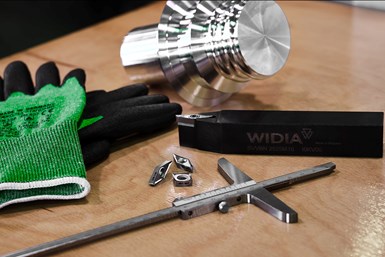Widia Chipbreaker for Machining Aluminum, Nonferrous Materials
The insert is designed to be versatile, reliable, and cost-effective, making it a universal solution for customers seeking lower cutting forces, extended tool life and greater tooling productivity when machining a variety of nonferrous workpiece materials.
The AL Geometry insert portfolio offers multiple grades and styles, giving users product versatility. Photo Credit: Widia
Widia’s AL Geometry insert is part of its ISO Turning portfolio and is used for machining aluminum and nonferrous materials. It’s designed to be an affordable tooling solution for small- to medium-sized machine shops.
The insert is offered in two grades for increased machining versatility — an uncoated microfine carbide WU10HT grade and the PVD AlTiN coated grade WU05PT. Each grade is available in all standard styles, including C, D, R, T and V inserts to increase customer tooling options.
It is said the insert features a highly polished rake face for improving chip flow, resulting in shorter setup times due to less manual retrieval of chips following each cut. The periphery ground insert also features a sharper cutting edge to increase overall tooling precision and reduce cutting forces. Reliable tooling performances means customers can dedicate more time to machining and less time to postmachining deburring operations because of the reduction in built-up edge, the company says.
The AL Geometry portfolio is said to offer tooling versatility when machining different components and workpieces, while also providing more precise and reliable machining performance.
According to the company, the insert is versatile, reliable, and cost-effective, making it a universal solution for customers seeking lower cutting forces, extended tool life and greater tooling productivity when machining a variety of nonferrous workpiece materials, particularly aluminum.
Related Content
-
Tool Path Improves Chip Management for Swiss-Type Lathes
This simple change to a Swiss-type turning machine’s tool path can dramatically improve its ability to manage chips.
-
What Is Trochoidal Turning? How Might Shops Benefit From It?
While trochoidal milling might be a more well-known toolpath strategy, trochoidal turning can offer similar benefits such as high material removal rates especially for rough-turning operations.
-
Parting Off: The Case for Standardizing on Sawing
The value of rotary saw cutting for parting off operations could boil down to simple economics paired with process efficiency gains.










.png;maxWidth=300;quality=90)






